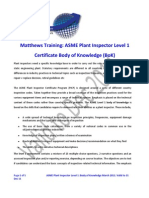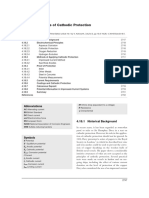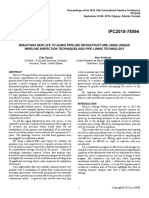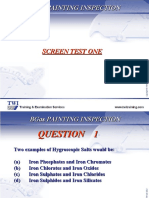Senior Corrosion Technologist EPG
Senior Corrosion Technologist EPG
Uploaded by
Pravas PadhihariCopyright:
Available Formats
Senior Corrosion Technologist EPG
Senior Corrosion Technologist EPG
Uploaded by
Pravas PadhihariOriginal Title
Copyright
Available Formats
Share this document
Did you find this document useful?
Is this content inappropriate?
Copyright:
Available Formats
Senior Corrosion Technologist EPG
Senior Corrosion Technologist EPG
Uploaded by
Pravas PadhihariCopyright:
Available Formats
Senior Corrosion
Technologist
Written Exam
Exam Preparation Guide
SCT Exam Preparation Guide – June 2020 | 1
Table of Contents
Introduction .................................................................................................................................................. 3
Target Audience ........................................................................................................................................ 3
Requirements ............................................................................................................................................ 4
Exam Blue Print ............................................................................................................................................. 5
Types of Questions........................................................................................................................................ 6
Description of Questions .......................................................................................................................... 6
Sample Questions ..................................................................................................................................... 6
Answer Key: .................................................................................................................................................. 7
Preparation ................................................................................................................................................... 7
Available Training* .................................................................................................................................... 7
Suggested Study Material ......................................................................................................................... 7
Standards .................................................................................................................................................. 8
Reference Material Provided During Exam............................................................................................... 9
What to Expect on Test Day .......................................................................................................................... 9
Arriving at the Pearson Test Center .......................................................................................................... 9
Computer-Based Test Demonstration ...................................................................................................... 9
SCT Exam Preparation Guide – June 2020 | 2
Introduction
The Senior Corrosion Technologist exam is designed to assess whether a candidate has the
requisite knowledge, skills and abilities (KSAs) that a minimally qualified Senior Corrosion
Technologist must possess. The 140 questions are based on the KSAs a Senior Corrosion
Technologist needs to be successful in the job. A candidate should have at least eight (8) years
of experience, possess a wide range of practical knowledge over multiple areas of corrosion and
knowledge of the control of corrosion.
Test Name AMPP Certified Senior Corrosion Technologist
Test Code NACE‐SCT‐001
Time 240 Minutes*
Number of Questions 140
Format Computer-Based Testing (CBT)
Passing Score Pass or Fail
*NOTE: Includes 4 minutes for the non‐disclosure agreement and 6 minutes for the system tutorial.
Target Audience
A Senior Corrosion Technologist is responsible for understanding the theory of corrosion and
corrosion prevention. The certification is geared toward persons who will work in all types of
corrosion and means of prevention as well as have knowledge and experience within the field
of specializations. The Senior Corrosion Technologist may have specialized knowledge or
experience related to corrosion prevention by protective coatings, testing, stress corrosion
cracking, chemical processes, and/or in pipelines, and is capable of performing responsible
work under the direction of Specialist level personnel but requires minimal supervision.
SCT Exam Preparation Guide – June 2020| 3
Requirements
Requirements for Certified Senior Corrosion Technologist
Work Experience & Education Requirements:
Bachelor’s degree in physical sciences or engineering with 4 years of experience in
responsible charge.*
*Refers to work experience at a level of responsibility requiring initiative, technical ability, and independent judgement.
Core Course and/or Exam Requirements:
Senior Corrosion Technologist Exam
Certification candidates have four (4) years to complete all requirements, including a successful completion of the
exam, and an approved application with the required work experience and education requirements.
Renewal requirements: Recertification application and approval required every 3 years
SCT Exam Preparation Guide – June 2020 | 4
Exam Blue Print
NOTE: At the end of the CBT exam candidates should log on to their AMPP profiles to view a
bar chart of strengths and weaknesses that correspond to these Domains.
Domain 1 ‐ Metallurgy 19‐23 %
Material properties
Carbon steel
Stainless steel
Material selection
Metallurgy standards (MR0175)
Interaction of materials
Corrosion resistance
Domain 2 – Chemical Treatment 18‐22 %
Pipeline corrosion
Corrosion inhibitors
Inorganic materials properties
Testing and programs
Organic material properties
Domain 3 – Cathodic Protection 24‐28 %
Corrosion basics
Impressed/stray currents
Galvanic series
Thermoplastics
Fundamentals of cathodic protection
Standards (SP0169),
Cathodic protection basics
Pipelines
Materials
Corrosion rates
Metallic structures
Mitigation methods
Domain 4 ‐ Coatings 21‐25 %
Surface preparation
Application methods/techniques/equipment
Coatings under insulation (CUI)
Coating anomalies/defects/failures
Protective coatings (organic/inorganic)
Curing mechanisms
Galvanizing
Domain 5‐ Internal Corrosion 5‐9 %
Microbiologically influenced corrosion (MIC)
Corrosion inhibitors
Chemical treatment
Monitoring methods
SCT Exam Preparation Guide – June 2020| 5
Domain 6‐ Planning & Safety 2‐5 %
General knowledge of safety
Job site safety
Personal responsibility
Chemical hazards
Permit requirements
Types of Questions
Description of Questions
This is a closed book exam. The questions consist of multiple‐choice questions where some
questions may have more than one answer. Items with more than one correct answer may
contain the phrase “SELECT ALL THAT APPLY” and you will need to select more than one
answer choice. The questions are based on the knowledge and skills required in the Senior
Corrosion Technologist industry.
Sample Questions
The sample questions are included to illustrate the formats and types of questions that will be
on the exam. Your performance on the sample questions should not be viewed as a predictor of
your performance on the actual test.
1. What materials are susceptible to Corrosion Under Insulation (CUI)?
SELECT ALL THAT APPLY
A. 200 Series Stainless Steel
B. 300 Series Stainless Steel
C. Carbon & Low Alloy Steel
D. Duplex Stainless Steel
2. What is a bioprobe?
A. Sample of bacteria
B. Sample of biofilm
C. Coupon used to assess sessile bacteria
D. Coupon used to planktonic sessile bacteria
3. NACE SP 0110 describes a rough rule that a partial pressure ratio above 500 and a
pressure below 20 creates different types of corrosion. What type of corrosion is
created at each pressure ratio?
SELECT ALL THAT APPLY
A. Sour if pressure above 500
B. Sweet if pressure below 20
C. Sweet if pressure above 500
D. Sour if pressure below 20
SCT Exam Preparation Guide – June 2020 | 6
Answer Key:
1. B, C, D
Reference: API 571
2. C
NACE Internal Corrosion Advanced Manual
3. C, D
Reference: API 571
Preparation
Available Training*
*AMPP courses connected to parallel path options
Suggested Study Material
ASM Handbook Volume 13
ASTM D2794 ‐ Standard Test Method for Resistance of Organic Coatings to the Effects of
Rapid Deformation (Impact)
ASTM STP 518 ‐ Stress Corrosion Cracking of Copper Metals
Cooling Water Treatment, Principles and Practice (Collin Frayne)
Corrosion Engineering (Mars G. Fontana)
Corrosion Inhibitors (CC Nathan)
Corrosion in the Petrochemical Industry (Linda Garverick)
Corrosion Prevention by Protective Coatings (Munger)
Corrosion Tests and Standards: Application and Interpretation (Robert Baboian)
Fitz Atlas for Coating Defects
Fundamentals of Inorganic Glasses (Varshneya and Mauro)
Fundamentals of Metallic Corrosion (Phillip Schweitzer)
Handbook of Corrosion Data, ASM 2nd Edition
Introduction to Corrosion Science (E McCafferty)
Local and International safety rules/regulations (i.e. OSHA, ISO, etc.)
AMPP Basic Corrosion Manual
SCT Exam Preparation Guide – June 2020 | 7
AMPP Cathodic Protection Tester Manual
AMPP Cathodic Protection Technologist Manual AMPP
Coating Inspector Program 1 Manual
AMPP Corrosion Engineer's Reference Book
AMPP Internal Corrosion Basic Manual
AMPP Internal Corrosion Advanced Manual
AMPP Internal Corrosion of Pipelines Manual Peabody’s
Control of Pipeline Corrosion, 3rd Ed Pipeline Corrosion
and Cathodic Protection (M E Parker) Publication 266 ‐
NiDi (Nickel Development Institute)
Standards
API 510 ‐ Pressure Vessel Inspection Code: In‐Service Inspection, Rating, Repair, and
Alteration
API 570 ‐ Piping Inspection Code
API 571 ‐ Corrosion and Materials
API 653 ‐ Tank Inspection, Repair, Alteration, and Reconstruction.
AWS D1.1 ‐ Structural Welding – Steel
AWS D10.18M/D10.18 ‐ Guide for Welding Ferritic/Austenitic Duplex Stainless Steel
Piping and Tubing
ISO 8044 ‐ Corrosion of metals and alloys – Basic terms and definitions
ISO 21457 ‐ Petroleum, petrochemical and natural gas industries — Materials selection
and corrosion control for oil and gas production systems
ISO 23936 – Part 1 on Thermo plastics
NACE MR0175 ‐ Selection and qualification of carbon and low‐alloy steels, corrosion‐
resistant alloys, and other alloys for service in equipment in oil and natural gas
production
NACE SP 0775 ‐ Preparation, Installation, Analysis, and Interpretation of Corrosion
Coupons in Oilfield Operations
SCT Exam Preparation Guide – June 2020 | 8
NACE SP 01699 ‐ Control of External Corrosion on Underground or Submerged Metallic
Piping Systems
NACE SP 0177 ‐ Mitigation of Alternating Current and Lightning Effects on Metallic
Structures and Corrosion Control Systems
NACE 1/SSPC SP 5 ‐ White Metal Blast Cleaning
NACE 2/SSPC SP 10 ‐ Near‐White Metal Blast Cleaning
NACE 3/SSPC SP 6 ‐ Commercial Blast Cleaning
NORSOK ‐ M‐501 Surface Preparation and Protective Coating
NACE TM0172 ‐ Determining Corrosive Properties of Cargoes in Petroleum
Product Pipelines
Reference Material Provided During Exam
No reference material provided. It is closed book exam.
What to Expect on Test Day
Arriving at the Pearson Test Center
When you go to the Pearson Testing Center, there are a few things you should know. Please visit
this link for information you should know before you go.
https://home.pearsonvue.com/test‐taker/security.aspx
Computer-Based Test Demonstration
Once you are in the testing room and at the computer, you will start with agreeing to the non‐
disclosure agreement and have a brief tutorial of using the system. Please visit this link for a
demonstration of the computer‐based exam. You will have the opportunity to practice
answering a variety of questions to help you get familiar with how it all works.
https://wsr.pearsonvue.com/demo/
SCT Exam Preparation Guide – June 2020 | 9
You might also like
- Senior Corrosion Technologist S) 2024-09-03 16 - 42 - 55-PC 11No ratings yetSenior Corrosion Technologist S) 2024-09-03 16 - 42 - 55-PC 111 page
- Refining Corrosion Technologist NACE-RCT-001: NACE Cathodic Protection Technician (CP 2) Written Exam100% (3)Refining Corrosion Technologist NACE-RCT-001: NACE Cathodic Protection Technician (CP 2) Written Exam16 pages
- AN115B Corrosion Rate Calculation ER ProbesNo ratings yetAN115B Corrosion Rate Calculation ER Probes1 page
- Dacon Pulsed Eddy Current Presentation 2016No ratings yetDacon Pulsed Eddy Current Presentation 201616 pages
- Pipeline Corroson Integrity Management EPGNo ratings yetPipeline Corroson Integrity Management EPG9 pages
- NACE CIP Part II - (5) Corrosion - (Qs - As)No ratings yetNACE CIP Part II - (5) Corrosion - (Qs - As)6 pages
- Senior Corrosion Technologist S) 2024-09-03 16 - 42 - 55-PC 30No ratings yetSenior Corrosion Technologist S) 2024-09-03 16 - 42 - 55-PC 301 page
- CP3: Cathodic Protection Technologist: No. CorrectNo ratings yetCP3: Cathodic Protection Technologist: No. Correct3 pages
- Senior Corrosion Technologist S) 2024-09-03 16 - 42 - 55PC 40100% (1)Senior Corrosion Technologist S) 2024-09-03 16 - 42 - 55PC 401 page
- NACE CIP Part II - (8) Health - Safety - (Qs - As)No ratings yetNACE CIP Part II - (8) Health - Safety - (Qs - As)6 pages
- Senior Corrosion Technologist S) 2024-09-03 16 - 42 - 55-PC 38No ratings yetSenior Corrosion Technologist S) 2024-09-03 16 - 42 - 55-PC 381 page
- Senior Corrosion Technologist S) 2024-09-03 16 - 42 - 55-Zaki-PC 2No ratings yetSenior Corrosion Technologist S) 2024-09-03 16 - 42 - 55-Zaki-PC 21 page
- J.N.Agarwal - Risk Based Pipeline Integrity Management System100% (1)J.N.Agarwal - Risk Based Pipeline Integrity Management System17 pages
- Senior Corrosion Technologist s) 2024-09-03 16-42-55-Zaki-PC 56No ratings yetSenior Corrosion Technologist s) 2024-09-03 16-42-55-Zaki-PC 561 page
- Senior Corrosion Technologist S) 2024-09-03 16 - 42 - 55-PC 27No ratings yetSenior Corrosion Technologist S) 2024-09-03 16 - 42 - 55-PC 271 page
- Senior Corrosion Technologist s) 2024-09-03 16-42-55-Zaki-PC 70No ratings yetSenior Corrosion Technologist s) 2024-09-03 16-42-55-Zaki-PC 701 page
- Senior Corrosion Technologist S) 2024-09-03 16 - 42 - 55-PC 39No ratings yetSenior Corrosion Technologist S) 2024-09-03 16 - 42 - 55-PC 391 page
- Senior Corrosion Technologist s) 2024-09-03 16_42_55-Zaki-PC 60No ratings yetSenior Corrosion Technologist s) 2024-09-03 16_42_55-Zaki-PC 601 page
- ROSEN Group Inspection of Corrosion Under Pipe Supports100% (1)ROSEN Group Inspection of Corrosion Under Pipe Supports8 pages
- Senior Corrosion Technologist S) 2024-09-03 16 - 42 - 55-PC 26No ratings yetSenior Corrosion Technologist S) 2024-09-03 16 - 42 - 55-PC 261 page
- 2018 ASME International Pipeline Conference - Breathing New Life To Aging Pipeline InfrastructureNo ratings yet2018 ASME International Pipeline Conference - Breathing New Life To Aging Pipeline Infrastructure9 pages
- Senior Corrosion Technologist S) 2024-09-03 16 - 42 - 55-PC 29No ratings yetSenior Corrosion Technologist S) 2024-09-03 16 - 42 - 55-PC 291 page
- Senior Corrosion Technologist s) 2024-09-03 16-42-55-Zaki-PC 43No ratings yetSenior Corrosion Technologist s) 2024-09-03 16-42-55-Zaki-PC 431 page
- Senior Corrosion Technologist S) 2024-09-03 16 - 42 - 55-PC 28No ratings yetSenior Corrosion Technologist S) 2024-09-03 16 - 42 - 55-PC 281 page
- Senior Corrosion Technologist S) 2024-09-03 16 - 42 - 55-PC 13No ratings yetSenior Corrosion Technologist S) 2024-09-03 16 - 42 - 55-PC 131 page
- Senior Corrosion Technologist S) 2024-09-03 16 - 42 - 55-PC 25No ratings yetSenior Corrosion Technologist S) 2024-09-03 16 - 42 - 55-PC 251 page
- Welding Inspection: Multi-Choice Questions Paper 3 Please Return This Paper UnmarkedNo ratings yetWelding Inspection: Multi-Choice Questions Paper 3 Please Return This Paper Unmarked4 pages
- Challenges in Corrosion: Costs, Causes, Consequences, and ControlFrom EverandChallenges in Corrosion: Costs, Causes, Consequences, and ControlNo ratings yet
- CP3written ExamPrepGuide Updated 9-19-16No ratings yetCP3written ExamPrepGuide Updated 9-19-1613 pages
- WD 40 Specialist Cleaner Degreaser Tds SheetNo ratings yetWD 40 Specialist Cleaner Degreaser Tds Sheet2 pages
- Paul Jourdan Up and Downstream Linkages in The Mineral Value ChainNo ratings yetPaul Jourdan Up and Downstream Linkages in The Mineral Value Chain51 pages
- Module - 4 Altenative Building Technologies Efficient FoundationsNo ratings yetModule - 4 Altenative Building Technologies Efficient Foundations54 pages
- Spot Detail Elevation Spot Detailsection Detail of Ceiling AirventNo ratings yetSpot Detail Elevation Spot Detailsection Detail of Ceiling Airvent1 page
- En-1640183239-Metal Roofing Tiles - Specification (Rev. TZS 948.2017)No ratings yetEn-1640183239-Metal Roofing Tiles - Specification (Rev. TZS 948.2017)14 pages
- 21 ATLAS 058 AIRnet Alu Product Information Sheet EN SCREENNo ratings yet21 ATLAS 058 AIRnet Alu Product Information Sheet EN SCREEN4 pages
- Nominal Composition Standard Inventory SpecificationsNo ratings yetNominal Composition Standard Inventory Specifications3 pages
- Ak Steel Armco® PH 13-8 Mo Product Data Bulletin - Apr 2019 - 95No ratings yetAk Steel Armco® PH 13-8 Mo Product Data Bulletin - Apr 2019 - 9544 pages
- Technology For Stainless Steel-Making Slag by Using SiC in The Waste Refractory Material - Nagata - Euroslag2024 - VFNo ratings yetTechnology For Stainless Steel-Making Slag by Using SiC in The Waste Refractory Material - Nagata - Euroslag2024 - VF13 pages
- Cleanroom Systems Ultratech Precision: Insulated PanelsNo ratings yetCleanroom Systems Ultratech Precision: Insulated Panels24 pages
- Enviro Strip XL Aviation Grade Corn Hybrid PolymerNo ratings yetEnviro Strip XL Aviation Grade Corn Hybrid Polymer2 pages
- Kz01-Cv-Spe-68-0004 Design, Fabrication & Erection of Structural Steel Work100% (1)Kz01-Cv-Spe-68-0004 Design, Fabrication & Erection of Structural Steel Work45 pages
- NX Pit-Type Furnaces: The NX Turnkey Nitriding/Nitrocarburizing SystemNo ratings yetNX Pit-Type Furnaces: The NX Turnkey Nitriding/Nitrocarburizing System2 pages
- Copper and Copper Alloys EN Standards For Copper AlloysNo ratings yetCopper and Copper Alloys EN Standards For Copper Alloys4 pages
- Senior Corrosion Technologist S) 2024-09-03 16 - 42 - 55-PC 11Senior Corrosion Technologist S) 2024-09-03 16 - 42 - 55-PC 11
- Refining Corrosion Technologist NACE-RCT-001: NACE Cathodic Protection Technician (CP 2) Written ExamRefining Corrosion Technologist NACE-RCT-001: NACE Cathodic Protection Technician (CP 2) Written Exam
- Senior Corrosion Technologist S) 2024-09-03 16 - 42 - 55-PC 30Senior Corrosion Technologist S) 2024-09-03 16 - 42 - 55-PC 30
- CP3: Cathodic Protection Technologist: No. CorrectCP3: Cathodic Protection Technologist: No. Correct
- Senior Corrosion Technologist S) 2024-09-03 16 - 42 - 55PC 40Senior Corrosion Technologist S) 2024-09-03 16 - 42 - 55PC 40
- NACE CIP Part II - (8) Health - Safety - (Qs - As)NACE CIP Part II - (8) Health - Safety - (Qs - As)
- Senior Corrosion Technologist S) 2024-09-03 16 - 42 - 55-PC 38Senior Corrosion Technologist S) 2024-09-03 16 - 42 - 55-PC 38
- Senior Corrosion Technologist S) 2024-09-03 16 - 42 - 55-Zaki-PC 2Senior Corrosion Technologist S) 2024-09-03 16 - 42 - 55-Zaki-PC 2
- J.N.Agarwal - Risk Based Pipeline Integrity Management SystemJ.N.Agarwal - Risk Based Pipeline Integrity Management System
- Senior Corrosion Technologist s) 2024-09-03 16-42-55-Zaki-PC 56Senior Corrosion Technologist s) 2024-09-03 16-42-55-Zaki-PC 56
- Senior Corrosion Technologist S) 2024-09-03 16 - 42 - 55-PC 27Senior Corrosion Technologist S) 2024-09-03 16 - 42 - 55-PC 27
- Senior Corrosion Technologist s) 2024-09-03 16-42-55-Zaki-PC 70Senior Corrosion Technologist s) 2024-09-03 16-42-55-Zaki-PC 70
- Senior Corrosion Technologist S) 2024-09-03 16 - 42 - 55-PC 39Senior Corrosion Technologist S) 2024-09-03 16 - 42 - 55-PC 39
- Senior Corrosion Technologist s) 2024-09-03 16_42_55-Zaki-PC 60Senior Corrosion Technologist s) 2024-09-03 16_42_55-Zaki-PC 60
- ROSEN Group Inspection of Corrosion Under Pipe SupportsROSEN Group Inspection of Corrosion Under Pipe Supports
- Senior Corrosion Technologist S) 2024-09-03 16 - 42 - 55-PC 26Senior Corrosion Technologist S) 2024-09-03 16 - 42 - 55-PC 26
- 2018 ASME International Pipeline Conference - Breathing New Life To Aging Pipeline Infrastructure2018 ASME International Pipeline Conference - Breathing New Life To Aging Pipeline Infrastructure
- Senior Corrosion Technologist S) 2024-09-03 16 - 42 - 55-PC 29Senior Corrosion Technologist S) 2024-09-03 16 - 42 - 55-PC 29
- Senior Corrosion Technologist s) 2024-09-03 16-42-55-Zaki-PC 43Senior Corrosion Technologist s) 2024-09-03 16-42-55-Zaki-PC 43
- Senior Corrosion Technologist S) 2024-09-03 16 - 42 - 55-PC 28Senior Corrosion Technologist S) 2024-09-03 16 - 42 - 55-PC 28
- Senior Corrosion Technologist S) 2024-09-03 16 - 42 - 55-PC 13Senior Corrosion Technologist S) 2024-09-03 16 - 42 - 55-PC 13
- Senior Corrosion Technologist S) 2024-09-03 16 - 42 - 55-PC 25Senior Corrosion Technologist S) 2024-09-03 16 - 42 - 55-PC 25
- Welding Inspection: Multi-Choice Questions Paper 3 Please Return This Paper UnmarkedWelding Inspection: Multi-Choice Questions Paper 3 Please Return This Paper Unmarked
- Challenges in Corrosion: Costs, Causes, Consequences, and ControlFrom EverandChallenges in Corrosion: Costs, Causes, Consequences, and Control
- Paul Jourdan Up and Downstream Linkages in The Mineral Value ChainPaul Jourdan Up and Downstream Linkages in The Mineral Value Chain
- Module - 4 Altenative Building Technologies Efficient FoundationsModule - 4 Altenative Building Technologies Efficient Foundations
- Spot Detail Elevation Spot Detailsection Detail of Ceiling AirventSpot Detail Elevation Spot Detailsection Detail of Ceiling Airvent
- En-1640183239-Metal Roofing Tiles - Specification (Rev. TZS 948.2017)En-1640183239-Metal Roofing Tiles - Specification (Rev. TZS 948.2017)
- 21 ATLAS 058 AIRnet Alu Product Information Sheet EN SCREEN21 ATLAS 058 AIRnet Alu Product Information Sheet EN SCREEN
- Nominal Composition Standard Inventory SpecificationsNominal Composition Standard Inventory Specifications
- Ak Steel Armco® PH 13-8 Mo Product Data Bulletin - Apr 2019 - 95Ak Steel Armco® PH 13-8 Mo Product Data Bulletin - Apr 2019 - 95
- Technology For Stainless Steel-Making Slag by Using SiC in The Waste Refractory Material - Nagata - Euroslag2024 - VFTechnology For Stainless Steel-Making Slag by Using SiC in The Waste Refractory Material - Nagata - Euroslag2024 - VF
- Cleanroom Systems Ultratech Precision: Insulated PanelsCleanroom Systems Ultratech Precision: Insulated Panels
- Enviro Strip XL Aviation Grade Corn Hybrid PolymerEnviro Strip XL Aviation Grade Corn Hybrid Polymer
- Kz01-Cv-Spe-68-0004 Design, Fabrication & Erection of Structural Steel WorkKz01-Cv-Spe-68-0004 Design, Fabrication & Erection of Structural Steel Work
- NX Pit-Type Furnaces: The NX Turnkey Nitriding/Nitrocarburizing SystemNX Pit-Type Furnaces: The NX Turnkey Nitriding/Nitrocarburizing System
- Copper and Copper Alloys EN Standards For Copper AlloysCopper and Copper Alloys EN Standards For Copper Alloys


































































































